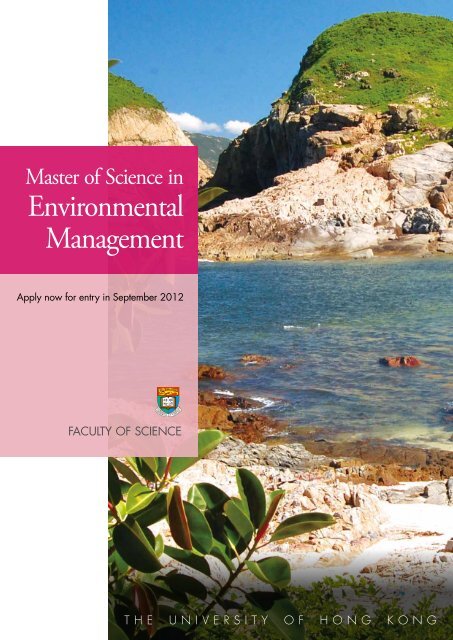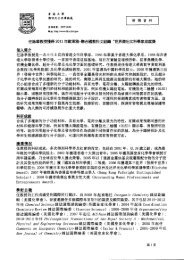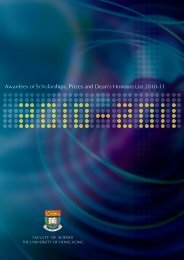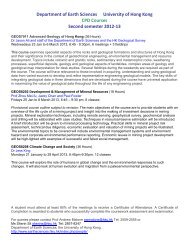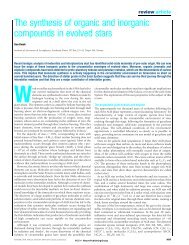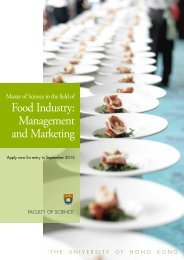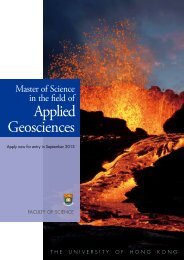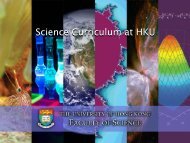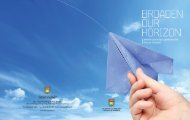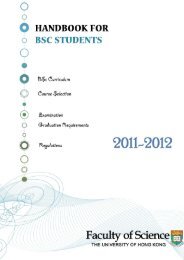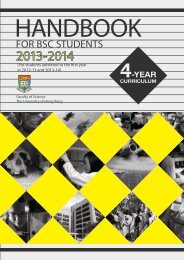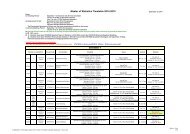Environmental Management - Faculty of Science, HKU - The ...
Environmental Management - Faculty of Science, HKU - The ...
Environmental Management - Faculty of Science, HKU - The ...
You also want an ePaper? Increase the reach of your titles
YUMPU automatically turns print PDFs into web optimized ePapers that Google loves.
<strong>The</strong> MSc(EnvMan) is an inter-faculty multi-disciplinary coursework programme. <strong>The</strong>programme will involve part-time study for a period <strong>of</strong> two years or full-time study forone year. <strong>The</strong> programme provides comprehensive training in the field <strong>of</strong> environmentalmanagement, addressing both the major environmental problems and their social, legaland economic context. <strong>The</strong> contents <strong>of</strong> the programme have evolved as Hong Kongitself has changed, but the basic objective <strong>of</strong> providing a broad, integrated overview hasremained the same. <strong>The</strong> teachers are internationally-recognized experts in their fieldsand have many years <strong>of</strong> experience in Hong Kong. <strong>The</strong> programme started in 1989and its several hundred graduates are now pursuing successful careers in governmentdepartments, environmental consultancies, NGOs and various industries. For moreinformation about the programme, please visit the following website: http://www.hku.hk/science/prospectives/pg/coursework/envmgtAdmission in September 2012<strong>The</strong> MSc Programme in <strong>Environmental</strong> <strong>Management</strong>has been launched since 1989. <strong>The</strong>re are more than 550graduates now pursuing successful careers in governmentdepartments, environmental consultancies, NGOs andvarious industries. <strong>The</strong> programme <strong>of</strong>fers:• A multi-disciplinary coursework programme with mostteaching on weekday evening. <strong>The</strong> programme willinvolve part-time study for a period <strong>of</strong> two years or fulltimestudy for one year*.• An integrated overview <strong>of</strong> the field <strong>of</strong> environmentalmanagement, addressing both the major environmentalproblems and their social, legal, ecological and economiccontexts.• Course materials focused on Hong Kong, but with a stronginternational and comparative dimension.• Courses taught by ecologists, engineers, earth scientists,planners, economists, lawyers, and environmentalists from<strong>HKU</strong>, as well as local practitioners in the field.* <strong>The</strong> new full-time mode is <strong>of</strong>fered from 2012-13 and issubject to approval.
Programme Structure (2012-13)<strong>The</strong> list <strong>of</strong> courses and their contents may be changed from timeto time.First Year – Core courses (27 credits)ENVM7003 Introduction to ecology 3 creditsENVM7012 <strong>Environmental</strong> economics and analysis 3 creditsENVM7013 Sustainability, society and environmentalmanagement3 creditsENVM7014 <strong>Environmental</strong> quality management 6 creditsENVM7015 Research methods and report writing inenvironmental management3 creditsENVM7016 <strong>Environmental</strong> policy 3 creditsENVM7017 <strong>Environmental</strong> law in Hong Kong 3 creditsAnd select one course from the following list:ENVM7018 <strong>Environmental</strong> field studies 3 creditsENVM7019 Intensive residential field studies 3 creditsSecond Year – Core courses (12 credits)ENVM8004 Dissertation 9 creditsENVM8006 <strong>Environmental</strong> impact assessment 3 creditsSecond Year – Elective courses (15 credits)ENVM8003 Conservation biology and management 3 creditsENVM8010 Earth science andenvironmental management3 creditsENVM8011 <strong>Environmental</strong> auditing and reporting 3 creditsENVM8012 <strong>Environmental</strong> health andrisk assessment3 creditsENVM8013 Air and noise pollution controland management3 creditsENVM8014 Special topics inenvironmental management3 creditsENVM8015 Directed studies inenvironmental management3 creditsENVM8016 Conservation and management<strong>of</strong> freshwater ecosystems3 creditsENVM8017 Conservation and management<strong>of</strong> marine resources3 creditsENVM8018 Urban planning and environmentaimanagement3 creditsENVM8019 Corporate social responsibility 3 creditsCourse Contents (Provisional)First Year – Core CoursesENVM7003 Introduction to ecologyThis course deals with the ecological processes determiningthe distribution and abundance <strong>of</strong> organisms, and whichin turn govern the structure and function <strong>of</strong> communitiesand ecosystems. <strong>The</strong> focus <strong>of</strong> the course is on how anunderstanding <strong>of</strong> ecology is important for environmentalmanagement. Together with lectures and student-centredlearning, this course also incorporates a practical fieldworkcomponent based at the Swire Institute <strong>of</strong> Marine <strong>Science</strong>.ENVM7012 <strong>Environmental</strong> economics and analysis<strong>The</strong> aim <strong>of</strong> this course is to equip students with the ability toundertake an economic analysis <strong>of</strong> the environment. It examinesthe environment in the context <strong>of</strong> the market mechanism andpolicies for improving environmental performance. <strong>The</strong>re isan emphasis on market failure and strategies for internalizingthe external costs <strong>of</strong> environmental damage. A good deal <strong>of</strong>attention is paid to cost-benefit analysis and methodologies forthe valuation <strong>of</strong> the environment. <strong>The</strong>re is also a consideration<strong>of</strong> alternative policy instruments from an economic perspective.This course further examines means <strong>of</strong> managing resources ina way that is both economically and environmentally efficient.ENVM7013 Sustainability, society and environmentalmanagementThis course begins with the intellectual debates on thedefinitions, conceptions and different schools <strong>of</strong> thought<strong>of</strong> the notion <strong>of</strong> sustainable development. <strong>The</strong> coursethen moves on to exploring ways <strong>of</strong> analyzing sustainabledevelopment at the macro- and the micro- levels, rangingfrom governance issues, frameworks, policies to projects.A number <strong>of</strong> tools for sustainable development are alsoexplained including community engagement, sustainabilityassessment, life cycle assessment, etc. Each year there willbe a special focus on a thematic area such as sustainableenergy, low carbon living, or planning for sustainable cities,to illustrate the challenges <strong>of</strong> implementing both local andglobal sustainability.ENVM7014 <strong>Environmental</strong> quality managementThis course introduces students to the types, sources and effects<strong>of</strong> environmental pollution and some <strong>of</strong> the key principlesand strategies used in combating pollution and managingenvironmental quality. Topics include water and air qualitymanagement, solid waste management and noise pollutioncontrol, with an emphasis on the situation in Hong Kong. Aspects<strong>of</strong> pollution control legislation and its enforcement, environmentaleducation and conservation will also be covered.ENVM7015 Research methods and report writing inenvironmental managementThis course is intended both as preparation for the dissertation,which forms a major part <strong>of</strong> the second year <strong>of</strong> theprogramme, and as a general introduction to writing reportson environmental issues. It is taught as a series <strong>of</strong> lectures,seminars and workshops. Subjects covered include: selectinga topic; the scientific method; asking questions; searching forinformation; surveys and interviews; the case study approach;formats, styles and presentation; avoiding plagiarism; citingsources; giving oral presentations; dealing with the media;basic data processing and data analysis.ENVM7016 <strong>Environmental</strong> policyThis course focuses on processes <strong>of</strong> environmental policymaking: how policy agendas emerge and evolve, the driversand barriers influencing policy development, institutionalstructures for environmental policy making, stakeholder
engagement, and the implementation <strong>of</strong> environmentalpolicy. <strong>The</strong>ories <strong>of</strong> policy making are explored in relation to theenvironment and sustainable development. <strong>Environmental</strong>policy making systems and outcomes are reviewed throughlocal and international case studies.ENVM7017 <strong>Environmental</strong> law in Hong KongThis course focuses on the statutory interpretation <strong>of</strong> the fourprincipal Ordinances and subsidiary legislation dealing withpollution in Hong Kong; namely the Water Pollution ControlOrdinance, the Air Pollution ControlOrdinance, the Noise Control Ordinanceand the Waste Disposal Ordinance. Someconsideration will also be given to theDumping at Sea Ordinance, the RadiationOrdinance, the Merchant Shipping(Prevention and Control <strong>of</strong> Pollution)Ordinance, the <strong>Environmental</strong> ImpactAssessment Ordinance, the Ozone LayerProtection Ordinance and internationalconventions effecting the law. Students will study the nature<strong>of</strong> environmental <strong>of</strong>fences, including the requirement forproving “mens rea” (intent) in order for certain <strong>of</strong>fences tobe successfully prosecuted. Students will also be introducedto the principles <strong>of</strong> judge made law (the Common Law) andwill learn to read and interpret relevant case law in order tobetter understand the current sentencing policies towardsenvironmental <strong>of</strong>fenders, both locally and in other CommonLaw jurisdictions.ENVM7018 <strong>Environmental</strong> field studiesThis is an experiential learning course. This course aims tobroaden students’ horizon and knowledge base on key aspects<strong>of</strong> environmental management and natural conservationthrough a series <strong>of</strong> field studies and visits to local and overseasorganizations. Topics include conservation and biodiversitymanagement, waste and wastewater treatment processes,water treatment processes, and corporate environmentalmanagement in practices. Field studies will be conductedin form <strong>of</strong> guided visits, field work, and invited lectures orforums according to the topics involved. Study trips outsideHong Kong such as Macau, Mainland China and Taiwan maybe considered. Students are required to attend at least 50%<strong>of</strong> all field trips organized over the two years <strong>of</strong> study period.ENVM7019 Intensive residential field studiesThis is an experiential learning course. This course aims to teachstudents with the field survey and study skills in biodiversityassessment through an intensive residential field course.Students taking this course have to conduct hands on fieldsurveys <strong>of</strong> common plant and animal groups in Hong Kongsuch as vascular plants, mammals, birds, amphibians, reptilesand butterflies. Overseas field trip may be arranged for extrapractices in field surveys.Second Year – Core CoursesENVM8004 Dissertation<strong>The</strong> dissertation is an individual, independent research projectcarried out under the supervision <strong>of</strong> one or more <strong>Faculty</strong>members. Students may propose their own topics andapproach possible supervisors, or they may consider thosetopics suggested by faculty members. Normally, the studentdevelops the research outline in collaboration with his or her<strong>Faculty</strong> advisor(s) and then collects data, carries out analysis andwrites the report prior to the research colloquium where thestudent will present his/her work. <strong>The</strong> candidate shall makea formal presentation on the subject <strong>of</strong> his/her dissertation asrequired by the programme organizers, during the final semester<strong>of</strong> the teaching programme.ENVM8006 <strong>Environmental</strong> impact assessment<strong>Environmental</strong> Impact Assessment (EIA) is one <strong>of</strong> the mostimportant contemporary instruments <strong>of</strong> environmentalmanagement. Used widely around the world to identify theimpacts <strong>of</strong> development projects as well as strategic plans andpolicies, EIA plays a key role in many regulatory systems for theenvironment. This course reviews the development <strong>of</strong> differentapproaches to EIA, basic analytical principles, administrative andlegal systems for EIA, assessments at the project and strategiclevels (SIA), and case study applications in Hong Kong.Second Year – Elective CoursesENVM8003 Conservation biology and managementConservation biology is the essential scientific element in biodiversityconservation. <strong>The</strong> course will cover the basic principles and methods<strong>of</strong> conservation biology in a non-technical way. In reality, successfulbiodiversity conservation projects <strong>of</strong>ten require an integration <strong>of</strong>the welfare <strong>of</strong> local communities. As such, practical examples fromHong Kong and elsewhere will be used as case studies to illustratethe importance <strong>of</strong> different elements in conserving our biodiversity.ENVM8010 Earth science andenvironmental managementThis course examines major issues <strong>of</strong> earth science <strong>of</strong> relevanceto environmental management. Case studies based on pastexperiences with application to Hong Kong and other major coastalcities are emphasized. Topics include: chemical composition <strong>of</strong>earth materials; geochemical surveys; aspects <strong>of</strong> human health;quaternary record <strong>of</strong> environmental change; aspects <strong>of</strong> waterresource management; natural and human-induced hazards; coastalmanagement; aspects <strong>of</strong> waste disposals, etc.ENVM8011 <strong>Environmental</strong> auditing and reportingThis course is dedicated to the construction <strong>of</strong> an integratedenvironmental management system (EMS). <strong>The</strong> course considersthe design <strong>of</strong> the EMS, its implementation and issues <strong>of</strong>continuous improvement. <strong>Environmental</strong> auditing is dealt with inthe context <strong>of</strong> the systems-based approach. This course examinesaudit methodology, measurement and quality assurance. <strong>The</strong>approach is extended to the auditing <strong>of</strong> supply chains (particularlyin China). Emphasis is placed on practical approaches to improvingenvironmental performance over time. Methods and techniques<strong>of</strong> reporting on systems and auditing include both environmentalreports as well as social and sustainable development reports.ENVM8012 <strong>Environmental</strong> health and risk assessment<strong>Environmental</strong> Risk Assessments (ERAs) are a tool to determinethe likelihood that contaminant releases, either past, current,or future, pose an unacceptable risk to human health orthe environment. Currently, ERAs are required under variousregulations in many developed countries so as to supportdecision-makers in risk characterization or the selection <strong>of</strong>cost-effective remedial cleanup. This course introduces thetheory and practice <strong>of</strong> human and ecological risk assessments.Students completing the course will gain a sound knowledge<strong>of</strong> the concepts and principles <strong>of</strong> ERAs, management andcommunication as applied in practice; understand the basicrisk assessment tools (i.e. prospective, retrospective and tieredapproaches) to environmental risk management; be able to selectand apply the simpler tools to tackle risk issues; and appreciatethe interpretations <strong>of</strong> risk and its role in environmental policyformulation and decision making.
Programme Duration and Class SchedulesThis programme will involve part-time study for a period <strong>of</strong>two years or full-time study for one year*. Teaching takesplace mainly on weekday evenings, but there may be a fewsessions on Saturday, as well as a small number <strong>of</strong> field trips.All lectures are given in English.* <strong>The</strong> new full-time mode is <strong>of</strong>fered from 2012-13 and issubject to approval.Targeted StudentsMost students who enter the programme have experiencein one <strong>of</strong> the relevant sub-disciplines – engineering, ecology,environmental chemistry, teaching, planning, journalismetc. However, the MSc is also suitable for fresh graduatesand people working in other areas who intend to pursuea career in environmental management, or simply want toenhance their understanding <strong>of</strong> the field.AssessmentCourses in the programme are assessed in a variety <strong>of</strong> ways,by written coursework, examinations, or both. A dissertationon a topic <strong>of</strong> the student’s choice forms a major part <strong>of</strong>the second year.PrizesEach year Ada and Arthur Hill Prize in <strong>Environmental</strong><strong>Management</strong> and Fred Kan and Co Prize are awarded tomeritorious students.RequirementsA Bachelor’s degree with Honours in any field. Workexperience is useful but not essential.ApplicationApplication will be considered from March 1, 2012 until allplaces are filled.Course details can be downloaded fromhttp://www.asa.hku.hk/admissions/tpg/prospectusor http://www.scifac.hku.hk/pg/prospective/tpgOnline application can be accessed viahttp://www.asa.hku.hk/admissions/tpgProgramme DirectorDr Kenneth M Y LeungAssociate Prefessor, School <strong>of</strong> Biological <strong>Science</strong>sTel: 2299 0607 Email: kmyleung@hku.hkTuition Fees<strong>The</strong> composition fee for the full-time programmeis HK$100,000 # for the 2012 intake and that forthe part-time progamme is HK$50,000# per yearfor two years. <strong>The</strong> fee shall be payable in twoinstalments over one year for full-time study or infour instalments over two years for part-time study.In addition, students are required to pay CautionMoney (HK$350, refundable on graduation subject tono claims being made) and Graduation Fee (HK$350).For occasional students, the tuition fee is HK$2,000 #per credit.# Subject to approval<strong>Faculty</strong> <strong>of</strong> <strong>Science</strong><strong>The</strong> University <strong>of</strong> Hong Kong12 Chong Yuet Ming Physics Building, Pokfulam Road, Hong KongTel: 2241 5287 Fax: 2858 4620 Email: science@hku.hk http://www.scifac.hku.hk/pg/prospective/tpg


